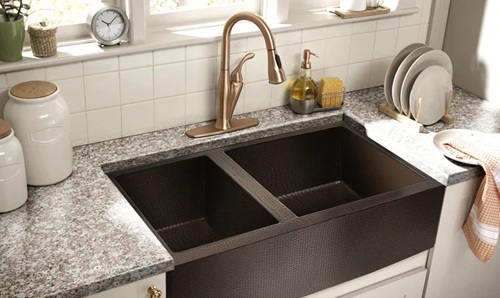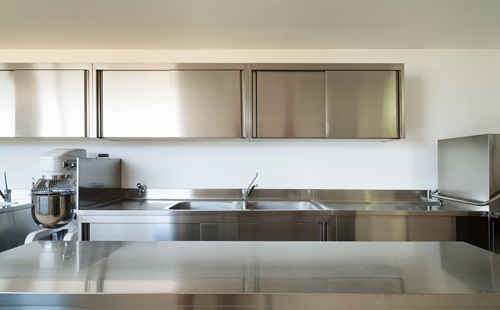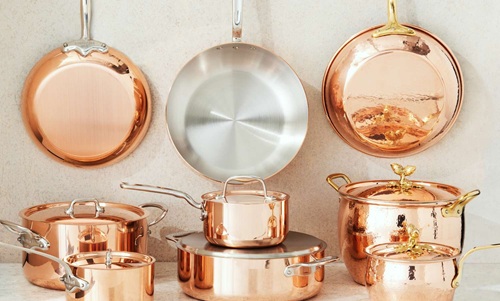When it comes to kitchen design, every element matters — from the countertops and cabinetry to the sink. Among the many choices available, copper kitchen sinks stand out as a bold and beautiful option. Known for their rich tones and timeless elegance, copper sinks bring a unique character to any kitchen, whether rustic, traditional, or modern farmhouse.
But like all design choices, copper kitchen sinks come with both benefits and drawbacks. Lets explore the pros and cons of copper kitchen sinks to help you determine whether this stylish material is the right fit for your kitchen.

What is a Copper Kitchen Sink?
A copper kitchen sink is typically made from pure or near-pure copper, often around 99% with a small percentage of zinc for strength. They come in various styles such as farmhouse (apron front), undermount, and drop-in, and are available in finishes ranging from bright polished copper to aged or hammered patinas.
These sinks are admired for their natural antimicrobial properties, warmth, and ever-changing appearance due to their “living finish.”
Pros of Copper Kitchen Sinks
1. Unique Aesthetic Appeal
Copper sinks offer a striking visual presence in the kitchen. Their warm reddish-brown hue stands out from traditional stainless steel or porcelain sinks. Whether polished for a bright shine or aged for a rustic patina, copper becomes a focal point.
Design Tip: Pair with dark countertops or wooden cabinetry for a dramatic, rustic, or industrial look.
2. Natural Antimicrobial Properties
One of copper’s biggest functional benefits is its ability to kill bacteria and viruses naturally. Studies have shown that copper can eliminate over 99% of harmful microbes within a few hours, making it a highly hygienic material — especially important in food preparation areas.
Fact Check: According to the U.S. Environmental Protection Agency (EPA), copper is the only metal registered as an antimicrobial material.
3. Develops a Rich Patina Over Time
Copper is a “living metal,” meaning it naturally changes color over time as it reacts with air, water, and other elements. This patina process gives each sink a unique, aged character that many homeowners find beautiful and authentic.
4. Durable and Long-Lasting
High-quality copper sinks are thick and robust, especially those with a gauge of 14 to 16 (lower gauge means thicker metal). With proper care, a copper sink can last for 50 years or more.
5. Versatile in Design
Copper sinks are available in a wide range of textures, shapes, and finishes, including smooth, hammered, matte, or glossy. They can be custom-built or hand-crafted, adding artisanal charm and uniqueness to your kitchen.
6. Eco-Friendly
Copper is a 100% recyclable material, and many sinks are made from recycled copper. This makes it a sustainable option for environmentally conscious homeowners.
Cons of Copper Kitchen Sinks
1. High Upfront Cost
Copper sinks are generally more expensive than standard stainless steel or composite sinks. Handmade or thick-gauge models can be particularly pricey, sometimes costing twice or thrice as much as other materials.
Price Range: Expect to pay ₹30,000 to ₹1,00,000+ (or $400 to $2,000+) depending on size, finish, and craftsmanship.
2. Requires Regular Maintenance
To maintain the appearance of a polished copper sink, you’ll need to clean it frequently and avoid acidic or abrasive substances. Things like lemon juice, vinegar, and harsh cleaners can damage the finish or cause uneven patina development.
Tip: Use a mild soap and soft cloth for cleaning. Avoid leaving dishes, food scraps, or wet sponges in the sink for long periods.
3. Sensitive to Acids and Staining
Copper reacts quickly with acidic substances like tomatoes, citrus, or even toothpaste. This can cause temporary or permanent discoloration depending on the finish. Water spots and fingerprints may also be more visible, especially on shiny finishes.
4. Patina May Be Unpredictable
While some homeowners love the evolving nature of copper’s patina, others may find it frustrating. Inconsistent coloration or staining due to water minerals or contact with metal objects can result in a mottled look that’s not always desirable.
Solution: Choose a pre-aged or hammered finish that hides imperfections and embraces the rustic charm.
5. Prone to Dents in Thin Gauges
Copper is a relatively soft metal, and sinks made from thinner copper (higher than 18 gauge) can dent or warp with heavy impacts. That’s why it’s crucial to invest in thicker-gauge (14–16) sinks for durability and resistance to damage.
6. Compatibility with Some Cleaners and Fixtures
Certain cleaning products and metal accessories like steel wool, bleach, or stainless steel racks can scratch or react negatively with copper. You may need to avoid these products to protect your sink’s finish.
Comparison: Copper vs. Other Kitchen Sink Materials
| Feature | Copper | Stainless Steel | Granite Composite | Porcelain |
| Aesthetics | Warm, unique, artisan | Sleek, modern | Matte, natural stone look | Classic, glossy |
| Hygiene | Excellent (antimicrobial) | Good | Good | Moderate |
| Durability | High (if thick gauge) | Very high | High | Moderate |
| Maintenance | Moderate to High | Low | Low | High |
| Scratch/Dent Resistance | Moderate | High | Very High | Low |
| Cost | High | Moderate | Moderate | Moderate |
| Lifespan | 40–50+ years | 30–50 years | 20–30 years | 15–25 years |
Is a Copper Kitchen Sink Right for You?
Choose a Copper Sink If:
- You want a warm, unique centerpiece in your kitchen.
- You appreciate the organic evolution of patina over time.
- Hygiene is a priority, and you like natural antimicrobial surfaces.
- You’re willing to perform routine maintenance to preserve the sink’s beauty.
- You prefer artisanal or rustic-style interiors with earthy tones and textures.
Avoid a Copper Sink If:
- You prefer a low-maintenance sink that doesn’t react to common substances.
- You don’t like changing finishes or unpredictable patina.
- You’re working with a tight renovation budget.
- You use strong chemical cleaners or acidic ingredients heavily and frequently.
Final Verdict
Copper kitchen sinks are a luxurious, artistic, and functional choice for homeowners who value beauty, character, and natural hygiene. While they require more care than stainless steel or granite composite sinks, their unmatched charm and individuality make them well worth the effort for many.
With proper installation and upkeep, a copper sink becomes not just a utility — but a centerpiece that ages gracefully and adds soul to your kitchen.

